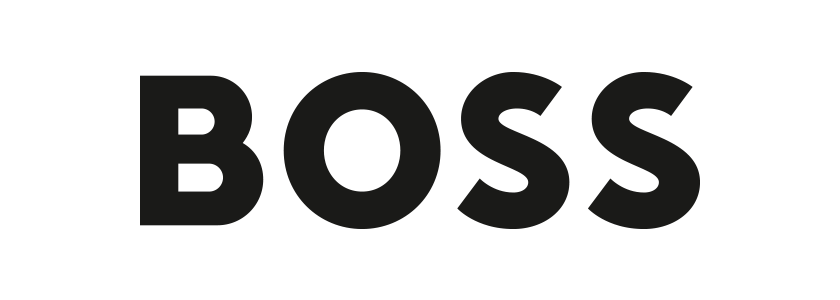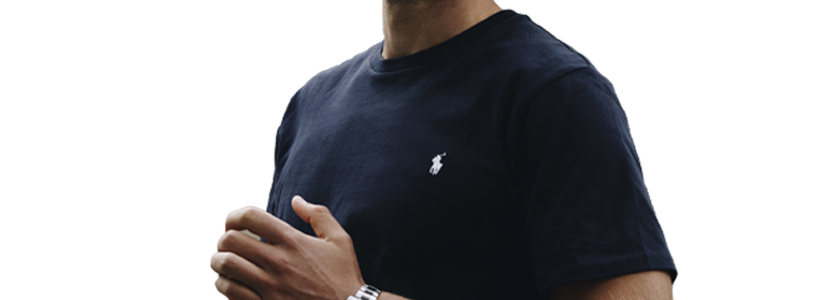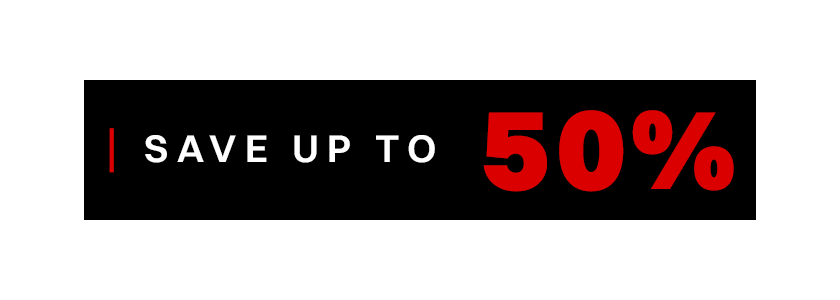
If we've missed the cinemas, we've also missed Matt Damon. he makes us think and laugh and makes the world a better place. The Stillwater star starred in a whopping three films in 2021, which means - in the best possible way - we can't get enough of him.
Matt Damon, in his own words, takes joy as his starting point, and it's pretty infectious. There are only a small handful of actors who are known for their work and their ability to create positivity and good vibes outside of their work. Tom Hanks is one of them, and Damon is another.
Although his 'status' can't be read by normal celebrity culture: he's not on social media, he's not one half of a celebrity couple, and he's not seeking undue media attention. Nevertheless, Matt Damon is still one of the most prominent men on the planet. And definitely one of the most likeable. He's in good spirits when we found him at the Cannes Film Festival, promoting the film Stillwater and attending the first major meeting of Hollywood stars since 2019. The industry stalled for over 12 months, with films delayed and cinemas closed, but the glamorous showing on the Riviera is a beacon of optimism. Now that movies are back on a more scheduled release, the optimism feels well-founded - and where there's optimism, it's almost by the law of gravity that we find Matt Damon.
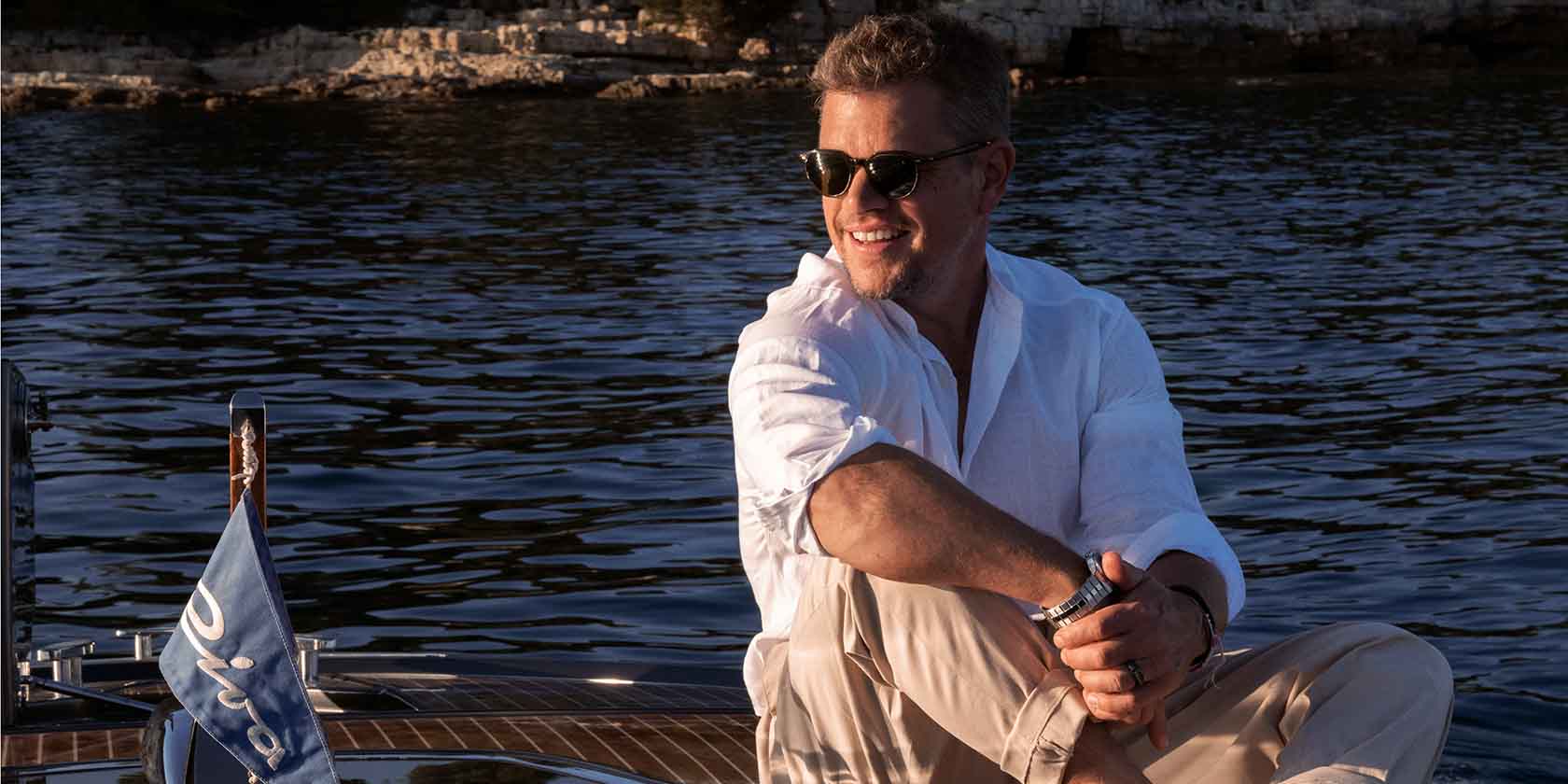
He was born in Cambridge, Massachusetts, a town across the Charles River from Boston. His mother was a professor of early childhood education, and his father was a stockbroker. They divorced when he was two, but his upbringing was not particularly traumatic. "I had two very loving parents; they were divorced, but they were both very involved in my life," he says. While some children's dysfunctional home lives can hamper opportunities at school, his parents' efforts were not in vain: Matt Damon flourished academically, amassing, as he says, "a tremendous amount of social capital - we didn't have a lot of money, but I had something more important: incredibly good teachers and an amazing older brother. I somehow had mentors everywhere.”
That foundation helped him get into Harvard in 1988. Matt Damon says his mother recently reminded him that Harvard called him back three times because, despite his good grades, they weren't sure about his admission. But despite his college education, he knew years earlier what he wanted. "I knew I wanted to be an actor from the time I was 13," he says. "We had a really serious drama department and the best teacher Ben and I could ask for - his name is Gerry Speca.”

Had to fight for footing
The name Ben, of course, refers to his lifelong friend Ben Affleck, with whom he later co-wrote Good Will Hunting (1997). They pursued acting together and are still a well-known duo on screen today. Matt Damon says: "We had a joint bank account where we put money we earned doing local commercials, and we used the money to travel to New York by bus, train or plane - even Trump Air at one point." The young Damon was uncompromising when it came to the acting path; he even started his Harvard application essay with: "Ever since I can remember, I've wanted to be an actor." Spoiler alert…
Although he achieved great success at an early age, his beginnings - like those of many actors - were fraught with rejection and disappointment. "Ben and I call it being 'OK-thanks,' because that's how we experienced it. You walk into a room and you're crying and screaming and howling, acting upset, and you've got tears and snot all over your face, and then you look up and they say 'OK, thank you' - and that's it, then you walk out with your backpack, it's a shitty feeling.”
Damon's entrance into the world of acting took place at the age of 16. But it would be 11 years before snot auditions were a thing of the past and he began to shape our cultural consciousness. Perhaps it's worth noting that Matt Damon has appeared in at least one film a year since 1995.
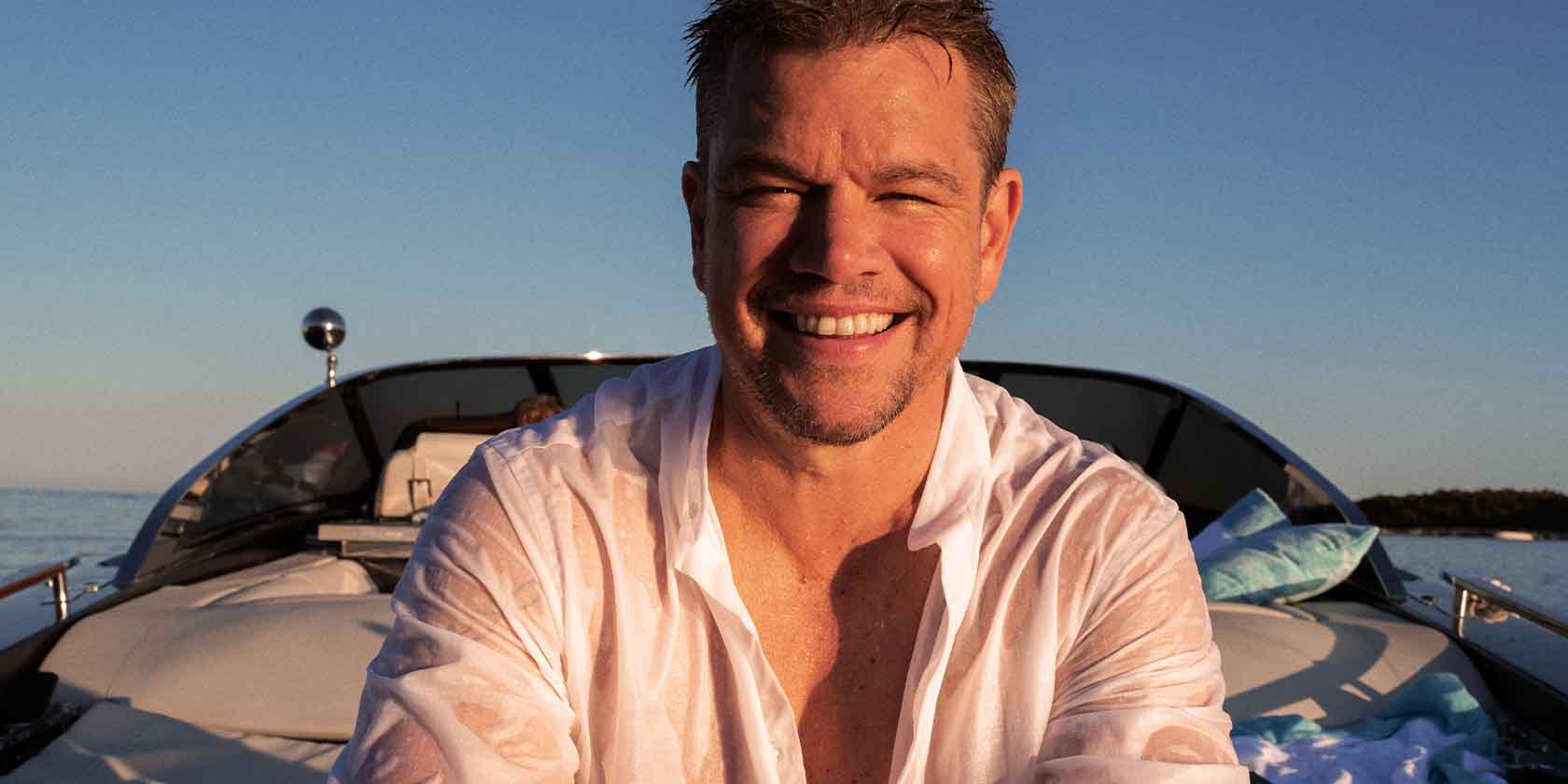
Wrote Oscar-winning script
In 1997, his semi-biographical screenplay for Good Will Hunting, which he co-wrote with Affleck, was released and the film was nominated for nine Academy Awards and grossed $225 million in box office. Damon was nominated for Best Actor, but lost to Jack Nicholson for As Good as it Gets. He did, however, win for best original screenplay, and his and Affleck's acceptance speeches revealed the unspoiled youth of a 27-year-old and a 25-year-old, respectively, whose exhilaration and confusion were not hindered by their tuxedos (including a rather smart pocket watch that Damon wore).
The enthusiasm was to change to bitterness and profundity. He came home at night and looked at his statuette and enjoyed a moment of clarity that could be juxtaposed with the young man's Oscar speech. He realised that it was not an elixir or a grail that could solve all the problems in his life or make everything perfect - and more to the point: he realised with gratitude that he did not have to spend the next 50 years finding that insight. He says: "It was like I had a flash-forward to an 83-year-old man sitting there with it and thinking 'Oh no, what have I done?' The gratitude was 'OK, I'm 27, thank God I didn't have to screw anyone over for this. It is what it is, let's move on'. It was a profound moment for me.”
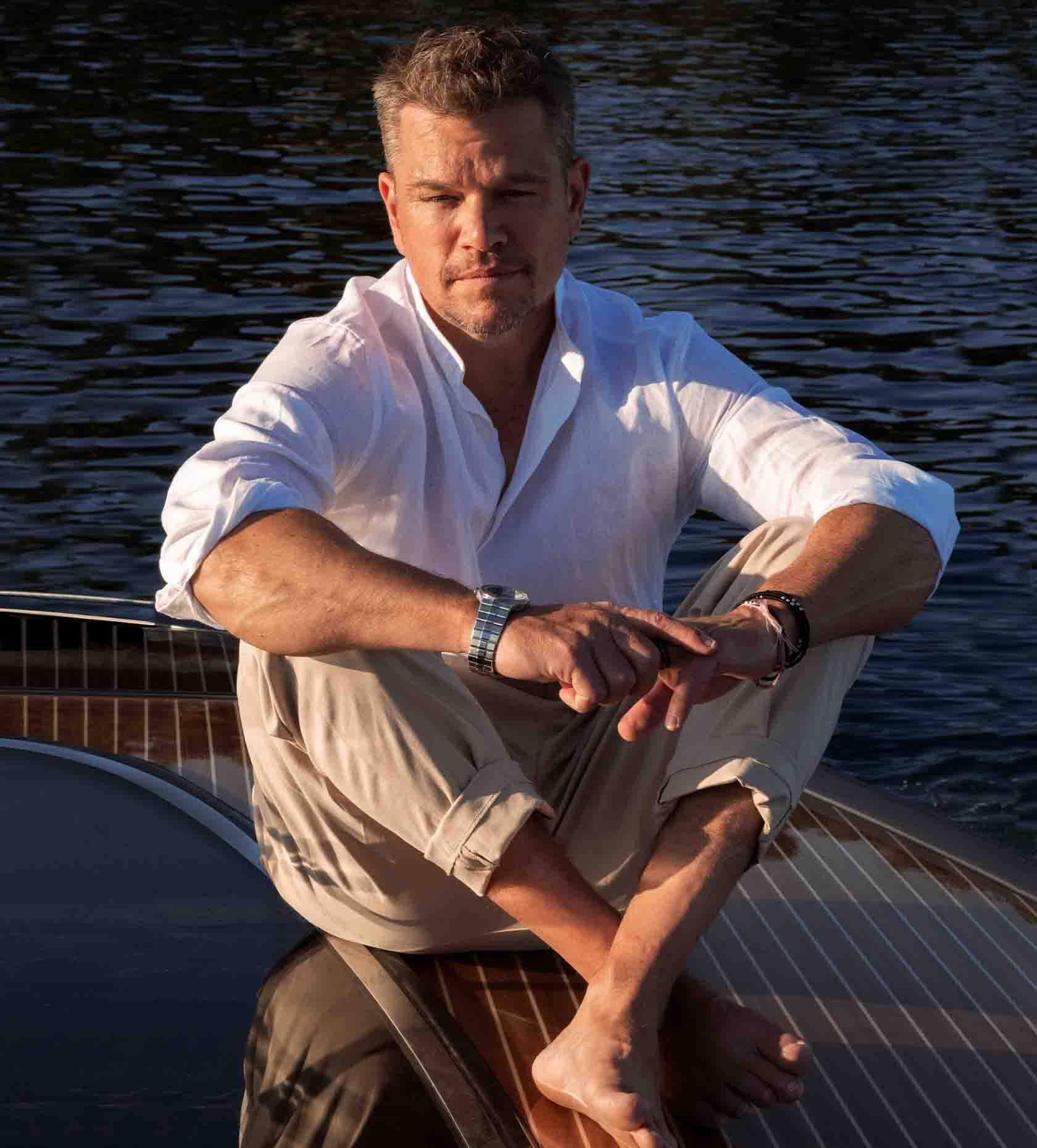
Seeking recognition
This does not mean that he no longer sought the thrill of public recognition, or that he concealed the ambition to achieve it. "I wasn't rid of the urge to care what people thought of me," he says. "I wish I was - that would be a monk's achievement. You want everyone to like your work. It's a part of you, it's what you put out into the world, and then you want people to like it just like you like it.”
In the years that followed, his output was phenomenal. "I wasn't expensive," he says. "My approach was to keep working, and I really felt, and still feel, that that's the way to be as good as you can be. To keep pushing yourself to do things that weren't so pleasant. I think some people get a bit expensive and think more strategically than impulsively, and I think I chose impulsively ... 'Oh, I like this person, I like this instructor, let's go, it'll be an experience'. Winning an Oscar freed me up to do that. You can do that as long as the films work; it's when they don't work that you have to listen, because everyone finds that the phone stops ringing, and there's no reason to think I'm any different.”
In 1998, he starred in a poker thriller by John Malkovich called Rounders, and he also played the title role in Steven Spielberg's Saving Private Ryan, which also won Oscars and is undeniably one of the most significant World War II films of the last 50 years. There's an internet meme circulating among journalists and fans: the story goes that he didn't attend the training camp that was supposed to get the actors in shape before filming. He was excluded so the rest of the cast wouldn't like him too much. It would compromise the anger they were supposed to express in the film when they were sent out with their lives at stake to save one man. I asked him if that was right: "Yes, it was Steven Spielberg's idea. I called and asked when training camp started and they said 'No, you're not going to training camp, it's just the others'. When I arrived on set, he explained that he wanted the others to be angry with me, and they were - they kept talking about their training camp: 'Oh, it was raining and we had to hike'. One day when we were sitting in the foxhole and they were complaining about it again, Tom Hanks said, 'It was a campout, damn it, it was a campout.”
The following year, Damon again starred with Ben Affleck, touching on a Rosary and Gold Star dynamic in Dogma, but the biggest project that year was another title role - in Anthony Minghella's The Talented Mr. Ripley. The film is remembered not only for its superb acting (Jude Law ended up with an Oscar nomination), but also for the costumes and details of post-war Italy. Matt's memories of the film revolve around the late director's talent: "Anthony completely turned Patricia Highsmith's novel on its head," he says. "He just had an incredible eye for detail, he was a fantastic director and person, and in every department there were world-class directors who wanted to be there because of him." It was a transformational role for Damon, who had to do a lot to implement the idea that he could be mistaken for Law. "I was supposed to look like Jude Law, which is impossible in the first place: it's like being told you have to look like Alain Delon. I had to at least make my body look like his. That meant about six miles a day on the treadmill - 'Damn it, Jude Law, I'm catching up. Or maybe I won't, but stay within spitting distance'.”
The Bourne Universe
In the new millennium, Matt Damon's popularity (and presumably his commercial prowess) grew and grew with films like Titan A.E., the first film in the Ocean's trilogy and the first of the four Bourne films, in 2002. The Bourne Identity was released about nine months after 9/11, and while it's up to the audience to find the film's moral, it's probably fair to say that it was a commentary on the competencies of the American intelligence services, which catered to both pacifists and nationalists. "I think the first three films were very much about the Bush presidency, and they were very much about that time," says Damon. "It has water torture, execution of people with hoods over their heads, disregard for common law - all the things that were going on in the real world at the time - and we tried to get all that into the film.”
The issues touched on in the Bourne films are not a distant memory; after Trump, the American institutions in question certainly seem important in the face of political power wielded for malicious means. If you rewatch the films now, you see their dual role, neither 100 per cent action nor 100 per cent political, which is probably the best place they could be. Damon says: "We wanted it to be a popcorn action movie, and we wanted new, different and exciting action, but we also had something to say. We got a lot out of the film.”
There's a moment in the first Bourne film - with a pen - that quickly became famous. It was significant because it summed up the new action hero perfectly. The days of Arnold Schwarzenegger and Sylvester Stallone, with camouflage and shots from the hip, were gone; if their film was the sledgehammer, Jason Bourne was the scalpel, and audiences were clearly interested in getting under the knife. When I interviewed Pierce Brosnan in 2018, he credited Bourne's style with shifting Bond's approach to the genre, and 2006's Casino Royale showed a modern 007 whose fighting style replaced the comic style of earlier Bond films with something much more technical and elegant.
Kimmels joke
When the Bourne movies came out, Matt was in the phase of his career that sets him apart from everyone else in Hollywood (except Tom Hanks): the ability to be self-critical and humorous, even when it makes him look like an idiot. It began on 14 December 2005, when Jimmy Kimmel, at the end of his talk show, out of the blue said: "I'm so sorry to Matt Damon, we didn't have time for him tonight". He kept saying it at the end of each show without any further explanation. It was all an exquisite joke by Kimmel to illustrate that his show only attracted lesser-known guests, and when Matt heard about it, he was ready to play along. He said: "People started coming up to me and saying 'Do you realize that Jimmy Kimmel says "Sorry, Matt Damon, we're out of time" every night on his TV show when he's wrapping up?" and I said 'Is that right? I've never met him'. It had been going on for a couple of months and they were doing a special edition in prime time to try to generate interest in his show, so they called me and said 'Do you want to come on at the very end and then we run out of time while you're on?' And I said 'That's funny, I'd love to'."
"So I went to Los Angeles, and Kimmel came up to me before the show and explained the story to me. He said, 'Look, the ratings are really terrible, and one night I was sitting there with a ventriloquist and a man in a boiler suit who were my guests, and it just slipped out: "Sorry, Matt Damon, we're out of time," and my producer broke down laughing, because we couldn't get any fat guests, so it was like these idiots were sitting out front and you were waiting in the back, and then we dumped you. We thought it was funny, so I did it the next night, just to make the team laugh again, and then it became a thing'."
"At least that's how it started. The idea was that he would make an overly long presentation, and I would sit there, and as soon as I started my first answer, he would say that they had run out of time, and then the scrolling texts would come on. Our audio was cut off and I was supposed to start yelling at him. If you watch the clip, you can see that I start yelling at him, red in the face, but what I'm yelling is that I can't remember when to go out, so I yell at him to give me a sign so I know when to storm out.”
What was meant to be a joke turned into Hollywood intrigue because a lot of people didn't understand - and in fact couldn't believe - that Hollywood types had a sense of humour. Matt Damon emerges as someone swimming against the tide of breathless familiar faces. The press has a large part of the responsibility by shamelessly evoking turmoil and pain by exposing private lives based on whatever interpretation suits their fancy. "There were all kinds of people who said 'Wow, you got really mad at Jimmy Kimmel.' And I just thought 'Seriously, how can you think that?' I only did it because I thought it was funny, and I immediately gave up on detailing an image. You're just going to lose that game eventually, somehow. I also think people watch your film because they think it's good, and you can't get someone to watch a film they don't want to watch, and it doesn't matter how many Instagram followers you have.”
What's great about Damon and Kimmel's collaboration is that the joke is still going today. They've almost become a comedy duo reminiscent of The Two Ronnies or Dudley Moore and Peter Cook. Recently, Kimmel brought Tom Brady to Matt's home to throw a football through a window, and during the worst part of covid-19, Matt showed up at Jimmy's house, in Jimmy's bedroom, with Jimmy's wife ... hm. Speaking of affairs, "The Battle" was revealed outside Jimmy Kimmel's talk show 12 years ago, when Kimmel's then-girlfriend, Sarah Silverman, got the idea to make a full-blown music video for a song called I'm Fucking Matt Damon. Since then, there's been a lot of fuss at Emmys, Oscars and on the red carpets. And it's a talking point on other talk shows like Ellen and Jimmy Fallon.
Damon's comedic inclinations haven't just been limited to Jimmy Kimmel. He also had a small role in Entourage, where he parodied - and almost ridiculed - his reputation for humanitarianism. His achievements and efforts in that regard have been extensive. He founded the H2O Africa Foundation, he works to fight AIDS in third world countries, and he's an ambassador (mentioned in Entourage) for the OnexOne Foundation, which helps feed hungry children. There was a rumor that he would perform the famous "Matt Daaamon" lines on Team America, which he confirms, "Oh, I definitely would have, but they haven't asked me. I definitely would have done it.”
Stillwater
Now that cinemas have reopened, many of the films that were delayed during the shutdown are getting more certain release dates; no fewer than three films starring Matt Damon were released in the second half of 2021. One of them - Stillwater - has been released. It takes place almost entirely in Marseille, where Matt attended the premiere during the film festival. It's about an unreliable father, Bill Baker, played by Damon. He lives in Stillwater, Oklahoma, and works (when he can get work) as a drilling operator, but he travels to the south of France to help his daughter Allison, who is in prison because she was found guilty of murdering her boyfriend.
Allison, played by Abigail Breslin (Little Miss Sunshine), feels she has a clue to prove her innocence. With the help of Marseille native Virginie, played by the excellent Camille Cotting (Call My Agent!), Baker attempts to follow up on the clue. The film is reminiscent of Taken, but Damon's Baker is no Liam Neeson - he's distracted and forgetful and has a background in drug abuse. The outcome is certainly not a foregone conclusion.
Matt's preparation for the role involved spending time with men like Bill Baker in Oklahoma. "They're about as tough as you can get in America," he says. "They've all got FFTP tattooed somewhere on them, it stands for Fuck, Fight, Trip Pipe. We're dealing with some tough guys." Trip Pipe refers to making deep holes in the ground, in case you were wondering. It's drill-bit-USA and blue-collar industry, it's poor and very, very far from Marseille. Marseille, for many snobs, is the ugly duckling of the Riviera, with the kind of poverty and crime that nearby (and extraordinarily wealthy) cities like Saint-Tropez, Cannes and Monaco don't want to talk about. But that's also what makes it a colourful and exciting place to film. Matt says of his experiences there: "I fell in love with the place. I thought it was such an amazing city and it's original - it has everything, the beauty.”
Stillwater explores themes of paternal love, childhood trauma, cross-cultural clashes and the subjectivity of justice. It will probably make every parent uncomfortable, and it highlights a moral playground that is difficult to navigate. The still waters have the deep ground, but not necessarily in a good way. Bill Baker's character is a quiet working man, but he's out where he can't bottom, in a world he doesn't understand, when all he knew before was how to fuck, fight and drill deep holes in the ground.
If it can be hard to characterize Matt Damon, perhaps it tells us all we need to know that his other 2021 films - No Sudden Move & The Last Duel - range from a 50s gangster movie with Benicio del Toro and a tale of honor in medieval France (directed by Ridley Scott) to the next installment of the Thor series for the Marvel Cinematic Universe, which premieres summer 2022. He is a man who continues on his own, with unlimited scope and invincible star power. Add his off-screen reputation, and we have the 21st century Paul Newman, who has dedicated himself to helping others, while creating a legendary status on the silver screen that will not go unnoticed. The world is at his feet, and given that he starts from the place of joy, we can all feel a little more optimistic about what lies ahead.




